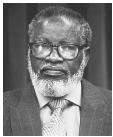NAMIBIA
Sam Nujoma
President

(pronounced " sam nu-YO-ma")
"All our actions and policies should be based on our motto of 'One Namibia, One Nation'…A united people will always emerge victorious above the problems of poverty, ignorance, hunger, disease, homelessness, unemployment and tribalism."
Namibia, formerly known as South-West Africa, became independent on 21 March 1990. Long considered Africa's lost colony, it was colonized by Germany for 36 years before South Africa took control during World War I (1913–18). Seven decades of South African rule saw the imposition of apartheid and patterns of uneven economic development between black and white segments of the populace. Whites, who make up about 6% of the population as of 2002, have one of the highest standards of living in the world, while the majority of blacks live in dire poverty.
Covering an area of 825,418 sq km (317,873 sq mi) but with an estimated population of 1.8 million people in 2002, Namibia is the most sparsely populated country on the planet. Over half the population lives in the northern third of the country, an area where higher rainfall makes subsistence agriculture possible. Despite its small size, the people of Namibia are ethnically diverse, ranging from small groups of Khosian hunter-gatherers to the majority Ovambo cluster of ethnic groups. English is the official language; however, it is only spoken by about 7% of the population. Thirteen indigenous languages are spoken in the country, as well as Afrikaans, which is a common language with most of the population, and German (32%).
Mining is the backbone of the economy, and uranium, diamonds, copper, and gold are major exports. Other rich mineral deposits such as coal, silver, and natural gas give the country the potential to become one of the wealthiest in Africa. Beef, mutton, and karakul wool pelts are the principal products of the agricultural sector. Agricultural production in the heavily populated northern region has great potential. Prolific fishing grounds lie just off Namibia's coast in the south Atlantic Ocean. Namibia's per capita gross domestic product (GDP) was estimated at US $4,500 in 2001, high compared to other sub-Saharan African nations but putting it in the lower income group in the world overall. The currency of Namibia is the Namibian dollar.
ADDRESS
Office of the President
Windhoek
Namibia
Comment about this article, ask questions, or add new information about this topic: